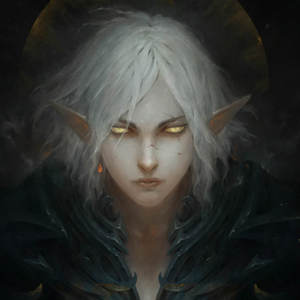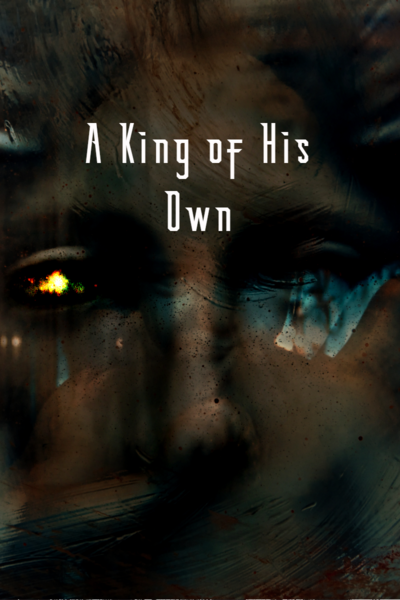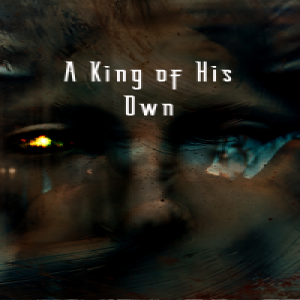On the southern flank, some way from the fierce fighting, Lord Edmund Gray sat at the head of a thousand mounted knights and men-at-arms. They were all of them eager, their weapons drawn, their helmets secured, waiting only for some signal to charge. There was only one issue: the Lavellan had their own mounted soldiers on the opposite side of the field, and they stood at a tactical stalemate as the infantry battle raged.
If either of the mounted detachments moved to support the main line, the other would ride and flank them. Their only option was to attack and defeat the other, but up until that point neither had been given the order to advance. Lord Gray knew why, having been told by the king early that morning: Armand wished to drag the battle out for as long as possible, and Edmund was to oblige him.
From his position Edmund could see the eastern side of the valley, could spot Armand and his guard stay back from the fighting and pass orders to messengers who ran about the field to the various Lavellan commanders. Edmund didn’t know why he did this; there was little in the way of large-scale unit tactics, of advanced formations, feints or plots. It was an old-fashioned brawl, where the cavalry was held at the flank as security in the case of the unexpected. Edmund was glad of it – mounted knights in full armour often came out of battles unharmed, for even if they were defeated, they would be kept alive for ransom. He knew he was not the warrior that Wulfsurd was, nor the strategist that his king was known to be, but he was a Duke and that gave him a position of command. Even so he looked forward to the idea of defeating the arrogant and snivelling Marquis Souchon, who commanded the cavalry of his foe.
“Lord Duke,” a man called to him, pointing across the valley field to where a rider galloped towards the Marquis from the direction of King Armand. “They send a messenger.”
“Do they plan to attack?” The duke asked himself, watching carefully as the messenger came to a halt by the Marquis and passed to him an order. “They do,” the duke answered himself. The Lavellan cavalry suddenly drew their weapons, and with the Marquis sounding a horn they set off in a trot directly towards them.
“We must meet their charge,” the duke told the man by his side, “sound the order to advance.”
The knight nodded, then raised the Sarkanian flag high upon a pole and waved it. “They advance, and we advance now to meet them!” The knight called out. “Follow the duke now into battle and bring glory to our brothers!”
“Attack!” The duke cried, bracing his lance-like spear forward and setting off into a trot. The Lavellan were in full gallop now, but the Sarkanians soon caught them in speed, and like two storms they rolled across the field against each other only to collide with horrendous thunderous roars.
Instantly the duke’s lance broke against a Lavellan’s breast, but it knocked the man down from his steed to be trampled by others. He went on, he and his closest men breaking the enemy charge and piercing deep into its ranks like the point of a wedge. Behind them their allies filled in to support, but the deeper they went the more that point became enveloped by their enemies’ steel and the advance slowed to a savage, crawling melee. The duke was forced to throw away his spear and draw his sword, then use it to attack the men to the right of him while his shield defended him from those at his left.
“The Marquis has fallen!”
Those words were called several times before men realized what they meant, and soon it was being repeated across the battle by knights of both sides. “The Marquis has fallen!” The Sarkanians yelled with glee. “The Marquis has fallen!” The Lavellan cried with devastation.
The duke hadn’t seen it, couldn’t verify the truth of the words, but the more they were shouted the more likely they became. There was only one thing to do now; slog through and beat the rest of them.
-
“The Marquis has fallen in battle,” the Lavellan messenger cried, riding up to King Armand with urgency.
Armand was sat upon his steed, surrounded by his mounted guard, and swore under his breath at the news. “Damn him!” Armand then shouted. “Damn him twice!”
“Calm down, my liege,” said Alaric Laurens, who sat mounted by his side and watching the battle. “The reinforcements will be here soon, we need only tie down their mounted knights long enough for them to arrive. Valen has already committed his guard to the melee, so they have no-one else they can spare.”
“You are right of course,” Armand replied, watching Alaric carefully. It was almost unnerving how similar Alaric looked to Armand’s own son Antoine, with his short dark hair and narrow jawline. But Antoine had died, and no matter how much Alaric resembled him his eyes were far too blue to be of his own blood. Far too blue… But piercing, commanding…. Perhaps they were why Armand had come to trust him so much. “You will go and take command there, Alaric. Do not seek to drive them off the field, just rally the men and keep the enemy fighting! We are so close to victory; we need just a little longer!”
“Your will, my liege,” Alaric replied, then without another word he took off riding towards the southwest – and the fierce cavalry engagement that was taking part there.
The battle had remained a stalemate, Armand having ordered his soldiers before the fighting to win if they could, but to focus on keeping them pinned. They were doing that job in a most beautifully Lavellan way, and even from his viewpoint away from the combat he could see King Valen and his remaining son battle alongside their loyal soldiers. Armand wished that they would surrender, that the battle would come to a quick and sudden end so that they might join him as his own, but if not, he had no qualms about putting them all to death.
Another hour passed, the death toll growing ever higher despite the initial ferocity of the fighting drained away by fatigue. Men were no longer fighting like bears but making brief forays into combat with their foe before the aching muscles forced them to pull back again to take their turn to rest. Armand smiled at this, then turned south to see how Alaric had now stabilized the situation there despite the Sarkanian’s initial advantage.
“King Armand, men to the north!”
Armand snapped his head in that direction to see a thousand fresh soldiers fill the narrow space that led out of the valley, a proud Lavellan banner held by the commander. The banner was waved high, signalling one thing extremely clearly to all: reinforcements had arrived.
“They’ve come!” Armand yelled, clapping the nearest knight on the shoulder with his hand. “They’ve finally arrived! Quick now, mount your horses, draw your swords, we join the battle before it ends!”
The men at the north of the valley began marching south towards the battle-line, while Armand and his guards charged west into the thick of the fray. When all were there to get their taste of glory, when Armand was so busy trying to find blood that he could not notice, the reinforcements dropped their Lavellan standard to the ground.
Instead they raised Sarkanian banners, and at their head Lord Colbert and Sir Anselm appeared with weapons drawn and intentions clear. “Warriors,” Sir Anselm cried out, his voice gruff with decades of battle and command, “kill the Lavellan cowards!”
-
Prince Arian parried away a spear thrust from his saddle, then drove his blade down into the chest of an unarmoured foe. Quickly he pulled the blade free again, then turned and struck another in the back of the head who cried and went down. Near him, his father fought just as ferociously, and a little way down the line Wulfsurd’s prowess proved so great that Lavellan knights made a space around him that they dared not enter.
“Fight on, men! Kill them all! Our reinforcements come, and victory is ours!” Yelled the king.
Arian was perplexed for a moment but looked northward to find a thousand men charging into the flank of the Lavellan ranks, then pushing around into their rear. Suddenly the Lavellan line began to collapse, its men dying, throwing down their weapons or attempting to flee a great and sudden slaughter. It began in the north, but very quickly it escalated and rolled down the entire Lavellan front until suddenly Arian saw the Sarkanian soldiers near him charge forward to cut down the fleeing.
He looked south, watched as the Lavellan cavalry tried to peel off and save the battle, but Lord Gray merely ran his mounted knights into their flanks and soon they were in utter disarray.
And just like that, the Sarkanians had won. His father had won. But his brother was still dead.
“Armand!” Arian’s father suddenly screamed, having spotted the Lavellan king trying to flee on his horse. Valen rode after him, and Arian followed, but several of Armand’s mounted guard turned their horses around in a suicidal stand to let their lord escape the field. Valen managed to race through them, but Arian was too slow and forced to engage them.
Valen kept riding harder, chasing Armand across the valley floor. The distance slowly began to close, and Valen lifted a spear from the ground and held it to throw. He waited, growing closer, then aimed the spear tip and drew his arm back until finally he launched it as a javelin straight for Armand’s horse. It missed, and Valen swore, and then suddenly fell silent as an arrow was shot through his throat.
As his horse came to a slow stop King Valen II raised a trembling hand to his unexpected wound, the shaft between his fingers and his palm growing wet with his own warm blood. He took his hand away to look at it, then turned his horse around to see Arian screaming. Strange… He couldn’t hear him. He turned his eyes upwards to look at the blue sky one last time, then everything went dark.
“FATHER!”
Arian’s scream made the battlefield seem silent, but he could do nothing but watch as the king fell from his horse. He was galloping, hard, his only intention being to jump from his steed and tend to his king… But then he saw Armand turn back to look and smile.
Arian rode past his father’s body, his horse’s gallop turning to flight, as though the very wind itself pushed it to ride faster across the terrain. Arian held his blade ready, preparing himself as he grew closer and closer to the Lavellan king who tried desperately to escape. Armand reached the eastern hill, but it was steep and he was slowed, and Arian suddenly caught him with a wide swing of his sword.
Armand was knocked to the ground, his arm audibly breaking beneath him as the prince dropped his sword and dismounted. He stood over the king’s broken form, then began to kick him, and stamp on him, and then dropped down so that he could begin thrusting his fists into the plate that protected his face. Armand must have begged the prince to stop, but the prince could hear nothing but blood.
Eventually the kingsguard arrived and dragged Arian from Armand, keeping him restrained until his all-consuming grief and anger began to drain away for reason to take hold. “Take him in chains,” Arian eventually ordered, while Armand was curled into a ball and weeping on the hill’s slope.
-
Many were dead. His brother Caden, his father the king, and over two thousand more who fought and died so that he could stand there on the field in victory. Arian did not know whether to scream in anger or to cry, or to drop down onto his own sword and hope that it took him too.
“My lord,” a knight tried to say to him, but Arian completely ignored him and passed him with a step.
They had won, but Arian had lost. He was alone now, alone with an army he did not know what to do with, with victory over a king and a country he could care no less about. He did not want Lavell, or the glory of winning, he wanted the blood that pooled in the field to drain backwards into the bodies, and for them to stand up and walk backwards to their camps. He wanted time to reverse to when his father had first made the decision to start the war that was now left in his hands, and he wanted the king to instead announce there would be no war at all.
He wanted his father and brother back.
Arian took off his helmet and dropped it to the ground, and his eyes began to burn with tears that he was too numb and stubborn to cry. He sniffed, then with a steely gaze he devoured the blue sky until Harik Wulfsurd began walking towards him in battle-stained armour.
“Arian,” Harik said, his voice low and solemn.
“What is it, Harik?” Arian eventually answered, suddenly noticing that Harik had something in his hands. Harik looked at him and took a deep breath, then revealed a ruby and silver pendant that had been worn by his father.
“This belongs to you now, my prince,” Wulfsurd said, dropping it into Arian’s opened hand with deep sadness.
Arian looked at it, ran his thumb over it, then looked back up at Wulfsurd in silence.
“My king,” Wulfsurd addressed him, as he stepped back and bowed alongside all the soldiers around them.
Arian closed his eyes, and with a toss he threw the amulet down into the grass. “I am not your king,” he assured, then turned and walked away.











Comments (0)
See all